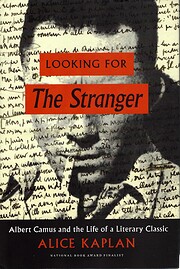

Klicka på en bild för att gå till Google Book Search.
|
Laddar... Looking for The Stranger: Albert Camus and the Life of a Literary Classicav Alice Kaplan
 Ingen/inga Det finns inga diskussioner på LibraryThing om den här boken.   ) )Insights into Camus’ Stranger. An English professor investigates the background and history of Camus’ The Stranger - which won the Nobel prize and was often used as an example of exploring existentialist philosophy - although Camus denied that. It follows Camus throughout his life until his death and examines his struggles with writing the Stranger - as well as his indebtedness to other writers. I certainly ended with a deeper appreciation of the book. I just recently read the book and as a 78 year old retired surgeon perhaps have a different perspective on the concept of life as ‘absurd.’ I saw too many people undergo potentially life threatening procedures and struggle to stay alive and recover to be able to identify with the idea of life as ‘absurd’ and that suicide is a legitimate choice. Nonetheless I find the book and its examination fascinating. Although a bit dry at times, this books gives a fascinating look behind the scenes of the writing and publication of The Stranger. It recounts how Camus may have been inspired by a friend's fight with an Algerian local on the beach and his time as a court reporter. Also described are the multiple hurtles to getting the book published in occupied Paris, from Camus's continued battles with TB, to the Nazi censors, to paper shortages. A solid 3.5⭐️. inga recensioner | lägg till en recension
Är ett supplement tillPriserPrestigefyllda urval
The Stranger is a rite of passage for readers around the world. Since its publication in France in 1942, Camus's novel has been translated into sixty languages and sold more than six million copies. It's the rare novel that's as at likely to be found in a teen's backpack as in a graduate philosophy seminar. If the twentieth century produced a novel that could be called ubiquitous, The Stranger is it. How did a young man in his twenties who had never written a novel turn out a masterpiece that still grips readers more than seventy years later? With Looking for "The Stranger", Alice Kaplan tells that story. In the process, she reveals Camus's achievement to have been even more impressive--and more unlikely--than even his most devoted readers knew. Born in poverty in colonial Algeria, Camus started out as a journalist covering the criminal courts. The murder trials he attended, Kaplan shows, would be a major influence on the development and themes of The Stranger. She follows Camus to France, and, making deft use of his diaries and letters, re-creates his lonely struggle with the novel in Montmartre, where he finally hit upon the unforgettable first-person voice that enabled him to break through and complete The Stranger. Even then, the book's publication was far from certain. France was straining under German occupation, Camus's closest mentor was unsure of the book's merit, and Camus himself was suffering from near-fatal tuberculosis. Yet the book did appear, thanks in part to a resourceful publisher, Gaston Gallimard, who was undeterred by paper shortages and Nazi censorship. The initial critical reception of The Stranger was mixed, and it wasn't until after liberation that The Stranger began its meteoric rise. As France and the rest of the world began to move out of the shadow of war, Kaplan shows, Camus's book-- with the help of an aggressive marketing campaign by Knopf for their 1946 publication of the first English translation--became a critical and commercial success, and Camus found himself one of the most famous writers in the world. Suddenly, his seemingly modest tale of alienation was being seen for what it really was: a powerful parable of the absurd, an existentialist masterpiece. Few books inspire devotion and excitement the way The Stranger does. And it couldn't have a better biographer than Alice Kaplan, whose books about twentieth-century French culture and history have won her legions of fans. No reader of Camus will want to miss this brilliant exploration. Inga biblioteksbeskrivningar kunde hittas. |
Pågående diskussionerIngen/ingaPopulära omslag
 Google Books — Laddar... Google Books — Laddar...GenrerMelvil Decimal System (DDC)848.91409Literature French Miscellaneous French writings 1900- 1900-1999 1945-1999 Individual authorsKlassifikation enligt LCBetygMedelbetyg: (3.89) (3.89)
Är det här du? |
||||||||||||||||||||||||||||||||||||||||||||||||||||||||||||||||||||||||||||||||||||||||||||||||||||||||||||||||||||||||